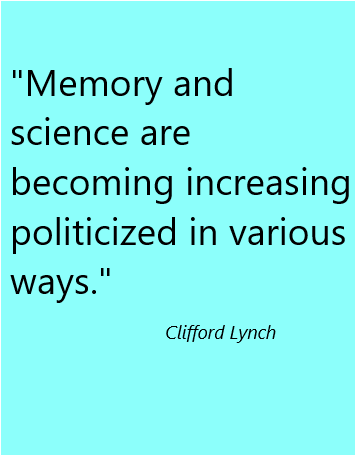The Coalition of Networked Information (CNI) held its biannual meeting in Washington, DC December 11-12, 2017. Clifford Lynch, Executive Director of CNI, gave his speech on the topic “Resilience and Engagement in an Era of Uncertainty.” Lynch outlined a number of challenges that are facing digital scholarship.
- The data refuge movement continues as librarians and scholars preserve data that is being pulled from web sites.
- Some research funders are not supporting infrastructure to manage research data. Research funds and universities need to work together.
- A very unstable world in politics and funding. Federal government is an unreliable steward (there are exceptions). Lynch states that “Memory and science are becoming increasing politicized in various ways.” The need to minimize single points of failure.
 The end of network neutrality will happen (the speech was given before the decision was made by the FCC). What is our next step and will this make it harder for academic institutions?
The end of network neutrality will happen (the speech was given before the decision was made by the FCC). What is our next step and will this make it harder for academic institutions?- An overall distrust of education, journalism, etc. makes it harder for us to do our work. It will get worse before it gets better. Also, how do we preserve this environment for later study?
- Words are the dominate paradigm but this is rapidly being replaced with audio and video technological advancements. For example, machine learning algorithms can be used to compile audio and video of a celebrity to fabricate having him say things he never did. Authenticity becomes important.
- Generative adversarial networks. Take two machine learning systems–one that recognizes fake images and the other that purposely create fake images–and have them talk to each other. Each system learns from the other and improves their own system. This appears to be a type of arms race.
- Trails of provenance will become hugely important. Authenticity will be important and will have to founded on provenance and the infrastructure to capture it.
- Open Access is not only important for scholarship but to society as well. Public libraries and other institutions are dependent on OA for maintaining a free society.
- Replicable and reproducible research are important yet it does not make sense to expect that ALL research be reproducible. Some exploratory research is designed for experimentation and for uncover new ideas rather than for reproduction. Some research is based on interpretation and thus, cannot be reproduced.
- We need outreach by scholars, scientists, and educators to defend scholarly communication on the public stage.
Lynch talked at length about open access. We need to recalibrate and reaffirm our commitments to open access. Decision points in the future: funding, policy matters, clarity by institutions about what they want, and storage of cultural evidence (from a non-academic environment) that is becoming the object of study by scholars. We will need to sort out how much we trust the cloud and cloud computing. Institutions need to re-examine our cloud strategy. We do not want all of our valuable material under one umbrella and this needs to be communicated to IT folks by librarians and archivists.
Last, Lynch talked about the technological uncertainties we face. Can we move from protoypes to social adoptions, specifically the issue of annotation? Hypothes.is is an example of annotation. Questions: Who gets to annotate, who gets to see them, where are they stored, who is going to run the annotation server, and are the authors comfortable with being annotated?
Another issue is the notion of containers for preserving and sharing software: standard configurations, versioning, and proliferations of software are concerns moving forward.
Three developments in media that are growing and influencing academia:
- The lifecycle of the capture to reproduction of 3D objects has happened. This will impact hugely on education as students will prefer to touch something rather than look at an image in a book.
- Libraries of 3D objects need to be created for storage and retrieval while standards for this lifecycle and documenting provenance for authenticity, will need to be established.
- Augmented reality beyond the academy in annotating places and architecture and annotating expereinces WHILE you are having the experience will be a future challenge. How do you store, preserve, retrieve, etc. all of this?
Other issues that are unclear and are still forming. For example, while there are prototypes and projects for linked data and cultural data, there are still problems of scalablity that need to be addressed. Quantum computing (which will invalidate authentification systems) and block chaining (how does it apply to educational institutions?) were briefly mentioned as topics of emerging concern.
Lynch ended his talk by mentioning effective collaborations based on shared values as becoming increasingly important to maximizing resources.
Many of the presentations were recorded and they can be found on YouTube: https://www.youtube.com/user/cnivideo/videos .
Conference link: https://www.cni.org/events/membership-meetings/past-meetings/fall-2017

One thought on “Resilience and Engagement in an Era of Uncertainty”